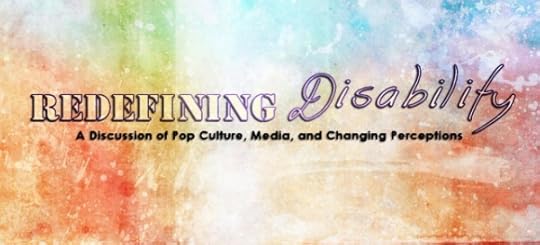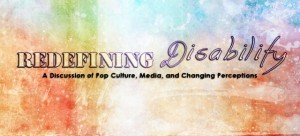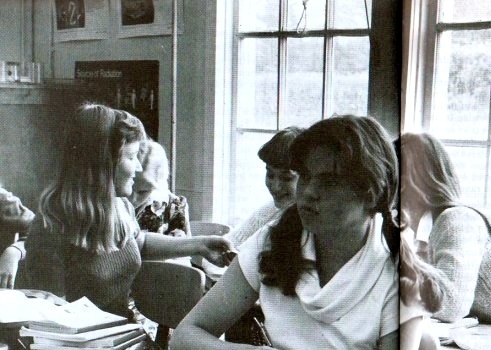Ruth L. Snyder's Blog, page 13
March 2, 2015
Redefining Disability Week 8: Family life and disability

In our experience, raising children who have special needs affects every facet of family life: family activities and recreational choices, schedule, discipline, holidays, even the type of work and ministry parents have. I don’t see living with a disability as a disadvantage, but it is different.
The “disabilities” of our children include difficulty with balance, cognitive limitations, fine motor challenges, behavioural challenges, hearing loss, and extreme near-sightedness (myopia). This means that although our children are able to participate in most activities, the activities will look different. For example, even though our twins are fourteen, they do not have the motor control necessary to participate in bowling without some help. They love the activity, but it has to be adapted for them. This means that family activities take more planning and preparation for our family than for some other families. The end result is that we don’t participate in as many activities because of time and energy limitations.
Our family schedule is also different from many families because our children seem to require more sleep. On school nights we aim to have our four younger children in bed between 8 and 9 p.m. We have discovered by trial and error that less sleep for our children affects everyone negatively. (I’ll leave the specifics to your imagination  ) Our schedule also has to allow more time for most every day activities that most people don’t even think about – dressing, eating, bathing, etc.
) Our schedule also has to allow more time for most every day activities that most people don’t even think about – dressing, eating, bathing, etc.
Discipline (teaching and training children) is a challenge for all families. In our family we have to make sure we consider our children’s abilities. I’m thankful our children have the ability to learn. Sometimes they learn quickly; other times it takes hundreds of repetitions to teach them. Some skills will never be attainable due to physical and cognitive limitations. For some of our children, we can assign extra chores. For other children assigning extra chores means that one of us adults will be working right beside the child, sometimes hand-over-hand. We’ve had to assess consequences to make sure one child’s consequences do not severely impact other members of the family.
Our family has had the opportunity and pleasure of going on some holidays many people don’t experience. We have made multiple trips to the United States and a couple trips across Canada. Our children love to travel. Probably our most memorable trip was traveling through 28 states in 30 days. A feat in itself, but more of a challenge when you have a family member without bowel control. Again, pre-planning is important, and generous amounts of time and energy.
One fact I’ve had to come to grips with is that I will not be able to work away from home full time, at least not in the foreseeable future. The special needs of our children require that my schedule is flexible. I’m thankful that I’ve been able to find ways to contribute to our community and broader world through writing and other work on my computer, and also through prayer.
It’s time for me to put breakfast on the table and start a new day. Thanks for stopping by. Does your family live with disabilities? How does it affect you? If your family is not affected by disabilities, did you find this post surprising in any way? Leave a comment and let me know.

Last year Rose Fischer started a Redefining Disability Challenge. This year she is continuing to invite people to join the challenge by blogging about a set of questions she developed. I’ve decided to join this challenge and most Mondays (or Tuesdays!) will be answering one of her questions.
February 24, 2015
Redefining Disability Week 7: Challenges with School Life

My husband and I believe that education works best when parents and the school work hand in hand. Over the thirteen years we have had our children in school, we have worked hard at establishing relationships with teachers, communicating, asking questions, and solving problems. We have had the privilege of working with many dedicated teachers, but school life continues to be a challenge for our specially-abled children.
Our first major challenge was accessing funding. When our twins were in kindergarten, the consultants we worked with told us our boys needed one-on-one assistance because their needs were so different. I dutifully filled out the required paperwork and handed it in mid-December. The principal told me funding should be approved and appropriate staff hired by the end of January. Every two weeks I checked in with the principal. He told me the paperwork was in and we needed to wait. I asked in January, then in February, and March, and April. Every time I was given the same answer. Finally in May I phoned the Minister of Education’s office. A couple hours later I discovered funding had been approved in December, but somehow communication fell through the cracks. I’m not typically an angry person, but that day I had to calm myself down for a few hours before I went to see the principal.
In Alberta there is funding for early childhood education (PUF) and then different funding when a child starts grade 1. After the initial funding issue was resolved, the principal told me our boys would probably go back to only one teacher assistant when they moved on to grade 1. After talking to some other parents who have children with special needs, I requested a meeting with the school division’s special education coordinator. In the meeting I outlined our boys needs and requested that two assistants continue to be provided, one for each boy. We took a break from our meeting and the coordinator went outside to observe our boys at recess time. It wasn’t until years later that he told me the story:
The boys played in a sandbox. When the bell rang, twin one stopped what he was doing and stood up. Twin two kept playing as if there had been no bell. Twin one spoke to twin two, but twin two kept playing. Twin one grabbed twin two’s hand, but twin two resisted. This continued for a while. By this time most of the other students were already back inside the school building. Twin one came to the coordinator, grabbed his hand and pulled him over to twin two. No words were exchanged, but the coordinator received the message loud and clear that he was being asked to help get twin two back into the building.
Since that time our twins have had one-on-one help half the school day and two-on-one help the other half. We were fortunate to have the same caring individuals work with our boys for seven years. We have faced other challenges since then – funding was available, but no therapists to fill the need; challenges with speech; communication gaps; challenges with social skills; changes in staff; misunderstandings (including having teachers phone Children’s Services instead of communicating with us).
I’m thankful for the progress our boys have made. Our task as advocates is challenging, but also rewarding. When I see our children laughing and playing it gives me the strength to go on.
February 20, 2015
2015 Writers’ Blog Hop Week 4 – Lifelong Learning
Today I’d like to share a couple of graphics programs that have made a huge difference for me.
WordSwag
Wordswag is a free app I downloaded onto my iPad. It’s very easy to use and is great if you want to create square graphics to use on your website or other social media. (All my blog hop graphics were made using Wordswag
Like:
Free app
Easy to use
Quick
Option to use your own photos or backgrounds included in the app
Includes free searchable pictures from Pixabay
Able to choose from many free font options; you can purchase other font options in the app
Built in share options to Instagram, Twitter, Facebook, Tumblr, Pinterest, Text, or E-mail.
Option to add a logo or watermark
Ability to use a graphic as a template
Don’t Like:
Not very flexible – can’t change the shape of the graphic (only options are rectangle or square) or select portions of font to change
Only available via iTunes
Canva
“Canva makes design simple for everyone. Create designs for Web or print: blog graphics, presentations, Facebook covers, flyers, posters, invitations and so much more.” Canva is much more flexible than Wordswag, but it will take longer to get a graphic designed.
Like:
Available as an app from iTunes, or directly on the web at http://www.canva.com
Choose from presized canvases for social media, poster, presentation, Facebook cover, Facebook post, etc.
Make your own custom canvas size (in pixels, mm, or inches)
Free backgrounds, fonts, and layouts are available, as well as text holders, borders and other items
If you have your own picture, you can upload it to Canva and use it in your design
Other pictures, fonts, etc. are available at the cost of $1.00 each/design
Basically if you can imagine it, you can make it on Canva
When you’re done you can download the graphic as an image or as a PDF file
You can share the graphic right from Canva
Don’t Like:
It takes a lot of time to make a great design
Sometimes when you change something in your design, you can’t go back if you change your mind
What have you learned in the past year that has helped you in your writing?
[image error] Loading InLinkz ...
Although this is the last week of the general writers’ blog hop, there will still be a blog hop in two weeks:

Social Media Blog Hop
#1 Favourite Social Media Site – Tell us where (Facebook, Twitter, Pinterest, etc.) you spend most of your time/energy and why (Week of Mar 2)
#2 Graphics for social media – Share your favourite source/app (Week of Mar 16)
#3 Scheduling posts – How often? Do you use a program like Hootsuite? Other tips? (Week of Mar 30)
#4 Content of posts – What do you share? Where do you find content? Ratio of promotional/other? (Week of April 13)
Note: If you’re interested in participating in the social media blog hop and want an e-mail reminder, send me an email and I’ll add you to the list.
February 17, 2015
Redefining Disability Week 6 – How Disability Affects the Activities of Every Day Life

Most of the time I’m so busy with every day life that I don’t stop to think about how much the special abilities of my children affect our activities. However, now that I think about it, most of the activities people take for granted take diligent effort with and for our children.
1. Getting Dressed
Our children are all able to dress themselves, but one son in particular has sensory issues which makes it a struggle to introduce any new pieces of clothing. He only wears “soft” things and will fight tooth and nail if we ask him to wear anything he deems inappropriate. It also takes our boys two or three times longer than most people to get dressed. Two of our boys don’t have the dexterity to get dressed any faster. Our other son is constantly distracted. Like most teens, our boys need to be reminded to change their clothes every day. 
2. Eating
I’m thankful that our children are all able to feed themselves. Two of the boys are able to pour their own milk or water, but the other one needs help unless we want liquid all over the table and floor. It’s not that he needs to be more careful; he just doesn’t have the physical control necessary. At age fourteen, our twins are just starting to cut their own meat. It’s still a challenge, and sometimes the meat ends up on the floor or in their laps.
3. Making Lunches
One of our boys is able to make his lunch independently, but I still need to check and make sure he takes an appropriate amount of food with him. (He often has trouble figuring out whether he’s hungry and when he eats, he doesn’t feel full.) One of the other boys is able to spread mayonnaise or butter on his sandwiches, but cannot cut cheese slices. Our other son is a PBJ sandwich fan (but he takes sunflower buttter sandwiches to school due to other student’s nut allergies.) He’s able to make his sandwiches independently.
4. Toileting
Many of the people who have the same genetic anomaly our boys have are not able to use the bathroom independently. All three of our boys are independent, but may pull their pants down before they get the door closed, or come out before their pants are pulled up properly, or forget to wash their hands. One of our boys also still has toileting accidents on a regular basis. When we travel, we have to plan our bathroom breaks ahead of time. Even then, he still soils himself at times.
5. Specialized Equipment
We have two children who wear hearing aids. This means we need to check and maintain them regularly, instill the habit of wearing the hearing aids and storing them properly, and remember to take them out before baths or swimming. We are finally at the stage where both children are able to put their own hearing aids in – sometimes totally independently.
We have three children who wear glasses. Only one of them is able to clean them independently. All of them have fallen with their glasses on and broken them. (When the children were small, the glasses caused injury on occasion when the children fell down.) One son has been known to hurl his glasses across the classroom when he’s angry, or stomp on them, or just snap them in half.
5. School
Our boys have required assistance at school since they started preschool. One of our boys does grade level work, but needs his work “chunked” or he gets overwhelmed. When he doesn’t understand something, he sits in his chair and may shut down if a teacher or assistant doesn’t intervene. Our other two boys are good readers, but only able to participate at the level of a five to seven year-old. Now that our boys are teenagers, the difference between them and their peers is increasingly evident.
6. Sports
Our boys are not able to participate in sports at the same level as their peers. We have participated in skating, hockey, baseball, curling, and basketball. However, the participation takes a lot of extra effort on our part as parents, coaches, boys, and their peers.
7. Community Activities
Our boys would rather stay at home than participate in many activities that are an expected part of most people’s lives. One of our boys is very sensitive to sound and gets scared easily (especially by balloons and brooms – not sure why!). Our visits to playgrounds, Farmer’s Markets, sporting events, etc. are often a challenge.
Each day is a new adventure! Do you or your loved one have special abilities? How are your every day activities affected?

Last year Rose Fischer started a Redefining Disability Challenge. This year she is continuing to invite people to join the challenge by blogging about a set of questions she developed. I’ve decided to join this challenge and most Mondays (or Tuesdays!) will be answering one of her questions.
February 11, 2015
Redefining Disability Week 5 – Significant moments connected to Disability

Last year Rose Fischer started a Redefining Disability Challenge. This year she is continuing to invite people to join the challenge by blogging about a set of questions she developed. I’ve decided to join this challenge and most Mondays (or Tuesdays!) will be answering one of her questions.

Here is this week’s question:
What are some significant moments/events in your life that connect to disability? — For example, you can talk about hearing a diagnosis for the first time, meeting a role model, learning something important that helped form your understanding of disabiliy, etc.
Our twin boys were placed with us for adoption when they were eighteen months old. They had just been taken off oxygen for the first time. We were told they had global developmental delays. We knew that one of the twins had a hearing loss. They both wore glasses. The meaning of “global developmental delays” dawned slowly:
They didn’t babble or make much of any sound, even when they cried.
It took six months of hand-over-hand feeding before one of the twins learned to feed himself.
We took our boys to our local health unit to get some tips on feeding and found out we knew more than the SLP who was supposed to help us.
They took their first steps at 27 months.
One day Levi climbed up on a chair. I cheered for a split second before he took a terrible tumble and landed on his head on the floor, because he didn’t have any ability to balance himself.
When the boys were two, we discovered they had an unusual genetic make up – an extra strand on the 15th chromosome. The genetics doctor had 10 case studies from all of North America with varying symptoms and prognoses. He did comment that he was encouraged by what the boys had been able to learn already.
We learned SEE2 (Signing Exact English) to facilitate communication because the boys didn’t talk until age four.
Although we were diligent in trying, the boys were not able to be toilet trained until they were five.
We decided to have the boys repeat grade 1 because they seemed close to catching up with their peers. However, as the year progressed, the gap between their knowledge and the knowledge of the other grade ones widened. I cried the day I realized our boys would never fit in.
We are often told the boys are in the 1st percentile for various skills.
Sometimes people see our boys are more capable than they really are. When they boys don’t live up to expectations, it’s easy for people to lay blame elsewhere, like on us as parents.
We continue to encounter challenges, like having one of our boys experience a seizure in the last few months. More trips to specialists, multiple explanations of medical history, and unfortunately a lack of bedside manner.
Sometimes it’s hard to know how much to share. As I read what I’ve written, it sounds very negative. All I’ve written is true and often difficult. However, there are many celebrations as well. As parents of children who have special needs, we have learned to celebrate even the smallest victory. When we see a contented smile, that makes the hard things worthwhile. When we hear a boy chuckle about something he’s reading, it puts a smile on our face. There’s nothing like the acceptance and love these special children give.
February 5, 2015
2015 Writers’ Blog Hop Week 3 – My favourite character

Picture from Young Pilot September 1980
Thirty four years later I can still picture him: my grade 7 teacher, Mr. Arthur Freeman. (The picture above was taken while I sat in his classroom.) He taught junior high for decades at Prairie Bible Institute. When I met him, his silver-grey hair masked his quick whit, keen mind, and ready sense of humour. His piercing blue eyes often clouded with tears as he implored us to learn from his mistakes. He believed in discipline and structure, but the virtue of love pervaded everything he did.
He often told stories to break down walls and build relationship. Stories of his early years; stories of raising his family; stories of how he and his wife prayed, believing God would turn the hearts of rebellious sons; stories of students coming back years later to make things right. Along with lessons of history and grammar, we learned the lessons of life. Mr. Freeman not only challenged us to memorize 100 verses and recite them with no mistakes, but he also did it himself. While we were allowed to recite individually with him, he recited in front of the class, allowing us to correct him.
Mr. Freeman not only taught us; he mentored us. This mentorship did not end when we walked out the door of his classroom. For at least ten years afterward he was my teacher, I received a bookmark and personal note from him on my birthday. I’ve heard from others that he did the same thing for them, and am assuming he sent those birthday greetings to every student he had in his class. If you do the math, that action alone speaks volumes.
I’m grateful for the amazing legacy he left for those of us who had the privilege of learning with him.
Did you have a teacher or someone else who mentored you? I’d love to hear about that person.

[image error] Loading InLinkz ...
February 2, 2015
Redefining Disability Week 4 – Where should the emphasis be: medical treatment, life skills, community integration or all three?

This week we are asked to consider where the emphasis should be for people dealing with what I like to call special abilities. (You can read my thoughts about the term “disability” here.)
I preface my answer with a question of my own: What is the specific issue we are dealing with? Some people have a medical diagnosis, others have a psychological diagnosis, and others intentionally pursue no diagnosis at all. In my mind, the type of diagnosis may affect the emphasis or treatment. For some, the focus will need to be entirely on medical treatment due to the severity of the medical condition. For others, there is nothing the medical community can do, so the focus will be on life skills and perhaps community integration.
We focused heavily on medical treatment for the first few years. Our van racked up thousands of kilometers as we drove to Edmonton (a 2 1/2 hour trip one way) an average of twice a month and also attended speech therapy and physiotherapy appointments a half hour away. However, now we only need to go to a few check-ups every year and the focus has switched to teaching life skills and getting our children involved in our local community. Life skills started with very basic concepts like how to eat. It took one of our twins six months of hand-over-hand feeding before he was able to scoop his food into a spoon and feed himself. His brother struggled with sensitivity to textures and needed yogurt to help him learn to eat crunchy and lumpy food. It’s probably a good thing we couldn’t see into the future. Hours and hours of teaching resulted in progress, very slow progress, but it has been steady. One of our boys still needs help pouring milk from a jug without spilling it. Another one still has toileting accidents both at home and at school. All our boys are all still learning to cut their own food. All three are able to dress themselves, but they need daily reminders to put on clean clothes. [I’m told this happens with “normal” kids too :)]
Integration into the community continues to be a challenge. Since we live in a small community, there are not many specialized services available. The boys were able to attend clubs when they were younger because their “differences” weren’t as obvious. Now that they are teenagers who only function at the level of 5-7 year-olds, they are not included in community groups without an adult present. After many years of attending summer camp as a family, we decided to send the boys independently. With a trip out to camp to sort out some initial problems, all three boys were able to last 5 out of 7 days. However, we were asked to pick them up early and informed we need to be prepared to attend with them if they come again. We also attempted to register a family team for community curling (two adults and two boys with special abilities). My husband attended the meeting, sharing very openly what our plans were, and no concerns were raised. However, later that week we received a phone call informing us our boys would not be able to play. Apparently there was a concern that our team wouldn’t be competitive enough.
We are grateful for several people who go the extra mile to make sure our boys experience some of the learning opportunities others take for granted. Each day is a new adventure – some discouraging and others amazing.
It’s your turn. How would you answer this week’s question?

Last year Rose Fischer started a Redefining Disability Challenge. This year she is continuing to invite people to join the challenge by blogging about a set of questions she developed. I’ve decided to join this challenge and most Mondays (or Tuesdays!) will be answering one of her questions.
January 31, 2015
Pregnancy and Infant Loss Remembrance Day

Image shared on Facebook by www.countthekicks.org.uk
This image brought tears to my eyes. 1998 is a long time ago in many ways, but the memories are still there. Many people who know me, don’t know. Miscarriage is a private grief many deal with, but few talk about.
My experience led to me write and enter the following story in a writing competition in 2005. The piece was subsequently published by Testimony Magazine. I share it here with hopes it will minister to others who grieve and help others understand how profound the grief may be for people who experience miscarriage.
Gifts from a Loving God
Leaves crackle under our feet as we walk. Lois, my mentor and friend, smiles at me. I relish this rare opportunity to spend time with her. “Infertility is a gift from God. I never thought I’d say that,” Lois confesses.
I swallow hard to bury my protest. “Are you crazy,” my heart screams. “How can anything this painful be a gift?”
The only career I want is motherhood. My desire haunts me, like a mirage in a dry, dusty desert. First, an infertility specialist informs my husband and me it is impossible for us to have children of our own. Then, against all odds, we conceive, only to face the crushing disappointment of miscarriage. Conception continues to elude us. Now what? Do we relinquish our dream of parenting children? Do we investigate other options, like adoption or foster care?
Since we have no children, I have the gift of time – time to volunteer in the local school and catering club, time to pray, time to grow. Over time, I learn to navigate the waves of grief as they splash over me – some gentle, others that leave me gasping and drowning in grief. Mother’s Day, the birth of a baby, interacting with nieces and nephews, watching parents play with their children are all bittersweet. Slowly I learn to receive and give the gift of compassion.
A year later, we begin our challenging journey on the road called adoption. In January, we hear about nineteen-year-old Mary and her baby. Mary is unsure she can provide for her baby and may be looking for an adoptive family. In May, after anxiously waiting for news that never comes, we sit down to fill out an adoption application with a private agency. That night the phone rings! “Hi, this is Sue. Mary asked me to phone and see if you are still interested in adopting her baby.” Four frantic days later, we bring home our daughter. For us, adoption is a gift of joy and celebration, but for a birth Mom, it is a gift of sorrow and sacrifice. Our daughter, Grace (unmerited favor) Victoria (victorious one), reminds us often of God’s loving gifts.
Four years later, we marvel again at God’s gifts – twin boys placed with us by Child & Family Services for adoption. (The boys were born at 27 weeks gestation, weighing less than two pounds each. The fact they are even alive is a miracle.) As we meet the foster parents and compare notes, we are in awe of God’s leading. The foster parents love Jesus Christ and rejoice that the boys will grow up in a Christian family!
Our 18-month-old twins introduce us to a completely new world – special needs. Only those who walk in these shoes know the special joys, challenges, and gifts these children provide. The first thing we notice about our boys is their silence – no babbling, no chatter. We learn they have “global developmental delays.” After six months of scooping with a spoon, our hand over his – every day, several times a day – we celebrate while Luke actually feeds himself. At twenty-seven months, we cheer while Levi takes his first wobbly step. A few months later, he is able to climb up on a chair by himself and stand. We clap, momentarily forgetting that Levi’s balance still needs help. He stands for mere seconds, grinning from ear to ear, before taking a terrible tumble to the floor. He lands on his head with glasses protruding at an odd angle, and blood gushing. We cringe as the doctor interrogates us. “Who was looking after your son when this happened,” she inquires while stitching Levi’s face. We learn to sign, using Signing Exact English, so the twins have a means of communicating with us. Progress is excruciatingly slow. Imagine our joy when we hear our boys, at age four, actually voice the words, “Mom” and “Dad” for the first time! The pediatrician who first saw our twins said they would never walk, talk, or feed themselves. We are thankful God has other plans for them!
Two years later, Jayson joins our family. Although Jayson is a full sibling to Luke and Levi, he has fewer obvious challenges. However, more often than not, we grit our teeth in frustration, quelling the temptation to yell. Jayson stands looking up at us, his brown eyes large. We search for any sign of sorrow, repentance, or desire to please. It isn’t there. He defies us, again. Then he lies to us, repeatedly, despite the fact that his siblings are providing a running commentary of what has taken place. Parenting skills that have worked with our other children are not nearly as effective with Jayson. God uses Jayson to give us the gifts of humility and total reliance on God.
Several years later, we receive another phone call. “I have good news! You’ve been matched with twins (a three-year-old boy and girl) for adoption.” However, the adoption falls through before we even meet the children, due to circumstances beyond our control. We grieve silently, unable to share details with our families because of legal issues.
Life settles into a comfortable routine. It seems our family is complete. We are thankful for the gift of children God has given. Now that the children are all in school, I decide to take on a part-time position with the local school board. A month later, the phone rings. “Hi, I have some news for you. The boys you adopted have a new baby sister. Would you consider adopting her if she becomes available?”
It does not take long for us to answer, “Yes!” Our file is still open from the “match” that fell through. This makes it possible for us to become foster parents in a matter of days. We drive to the hospital to meet our new little daughter. Although we are excited, we are also nervous. We have never cared for a newborn infant before, let alone one who has heart problems. The staff at the hospital is very gracious. We are patiently shown what we need to know to care for her. “She’s lucky to have you,” one of the nurses comments. “You know, some of the kids in here end up staying for up to six months because we have nowhere to send them. There are so many, we cannot spend the time we would like with them. Sometimes we have to sedate them, just so they stop crying!”
My eyes fill with tears. “God, have mercy on our nation,” I whisper as I cuddle our newest daughter close. She snuggles into the crook of my arm and falls asleep. Her face is a picture of peace and contentment.
There are still many unknowns before us. Each day brings new challenges, some very unexpected. Our stability in the midst of this change is Jesus Christ, our rock, our Savior, our guide.
Romans 8:28 says, “And we know that all things work together for good to them that love God, to them who are the called according to his purpose.” I can now honestly agree with Lois, “Infertility is a gift from God.” Without this gift, we may not have received many of the other gifts God has chosen to give us on our adoption journey. We are thankful for God’s blessings: past, present and future. Although we may not always understand, we can choose to accept every gift God sends our way and trust Him to work them all together for good.
January 27, 2015
Redefining Disability Week 3: Experiences with Medical Treatment/Therapy

Our experiences with medical treatment and therapy have been varied. I would say the “human” factor makes the biggest difference. Some doctors and therapists detach themselves and only dispense medicine and knowledge. Others genuinely care about those they are treating. They laugh with you and cry with you and cheer when there is progress. When one of these individuals moves on, you go through a grieving process. Here’s a summary of our experiences:
The first pediatrician who saw our twins said they would never walk, talk, or feed themselves. Perhaps he was merely trying to prepare people for the worst case scenario? Thankfully his prediction proved to be false.
The pediatrician who became our family pediatrician told us he wasn’t sure what the twins were capable of, but he committed to being with us each step of the way. He not only provided information, but he also gave helpful referrals and filled out copious amounts of paperwork to ensure they received necessary services.
Our pediatric ophthalmologist is a gem. He used sound effects and animated stuffies to help with examinations. He took his time and always made sure our questions were answered before he said goodbye. He cautioned us to be careful about making appointments in the winter, knowing that we traveled a few hours to see him. When he retired, he let us know and made sure someone else was there to take care of us.
The first speech therapist we were referred to knew less than we did about how to help our boys. We were told he could help us with the feeding issues one of our twins experienced. The best thing he did was admit he had no clue how to help us.
After enduring many speech therapy sessions that were a waste of time, we finally found someone who did more than diagnose problems. She taught us how to play with purpose by getting down on the floor with our twins and building a relationship with them. She not only told us what to do, but explained the reason behind it.
It took many phone calls and conversations before I located an occupational therapist who was willing to travel to us. He was honest about the rules which most people played by, but told us he would help in whatever area he could. He only did assessments when they were required for funding or some other useful purpose. Otherwise, he spent his time watching, listening, joking with the boys, and offering a professional sounding board for our family. He also made himself available for many phone calls and e-mails. To this day I know that I can ask for his opinion. I know he’s there for us.
My first encounters with special education were not positive. I discovered a system that was more about rules and money than about meeting the needs of unique individuals. Thankfully, I met other parents with more experience who helped me learn the ropes. (I chose to serve on our local school board for six years because I believed I could make a difference for other children and their families.) We also worked with some very caring teachers and educational assistants. People who were willing to go beyond the call of duty to make sure needs were met.
I’m thankful for the many amazing professionals we’ve interacted with on our journey. It truly does take a community to raise a child, especially when the child has unique needs.
What do you look for when you need medical intervention or therapy? What have your experiences been like?

Last year Rose Fischer started a Redefining Disability Challenge. This year she is continuing to invite people to join the challenge by blogging about a set of questions she developed. I’ve decided to join this challenge and most Mondays (or Tuesdays!) will be answering one of her questions.
January 23, 2015
Writer’s Blog Hop – Sample from Hope: Reflections to brighten the Dark Days of Life


One of the major projects I’m working on this year is a series of Kindle books (31 Days of … Series). The first book I’m putting together is Hope: Reflections to brighten the Dark Days of Life. I’ve worked on the cover design and received feedback. Now I need to finalize which colour scheme I’m going with. Which cover do you prefer? Left or right? Or is there a different colour you think I should try for the main title? (Let me know in the comment section below.)
Below you’ll find Focus, one of the devotionals I’ll be including in the book. I’m also learning to make podcasts, so listen in if you prefer 
NOTE: to see what other authors are working on, go to the blog hop.
Focus
By Ruth L. Snyder
It’s 8:03. The bus comes at 8:25. My daughter wants me to read a story to her and her brothers are looking at the latest Scholastic book order forms, trying to get my attention so they can tell me what they want to order. I want to tell them we’ll deal with the book order after school, except today’s the last day orders are being accepted. My daughter opens her book. I start reading. While she’s flipping to the next page I find one of the desired books and circle it on the order form. I read the next page. One son pushes his way closer so he can listen too. I read the next page then cut out the order form while the page is being flipped. This process continues until 8:11. The book is finished; the order forms are half filled out. It’s time to get jackets, backpacks, and mitts. I still need to add the order up, write a cheque, and write the book down on my daughter’s reading list.
“Get your jackets on. I’ll finish here.”
The children rush to the entryway. I add the order up, write a cheque, staple everything together, and write the book down on the reading list. I’ll clean up after the kids are on the bus.
I take the order and reading list to the entryway. Two boys are on their way out the door. My daughter is having trouble with her zipper. My other son is nowhere to be seen. I put the order and reading list in her backpack and help with the zipper. Then I go in search of my MIA son. He’s just coming out of his room.
“Hurry! It’s time to go.”
As I’m talking to him, a glimpse of the sky takes my breath away. The sunrise is beautiful. For over a week temperatures hovered in the minus thirty range. Today it’s warmer and the sky is showing evidence of the change in temperature. You know the saying: “Red in the morning, Shepherd’s warning.” I race to grab my camera and snap a picture. My daughter’s ready, and my son is close behind.
As we walk to the bus, my focus is on the beauty of the sunrise. The busyness of the morning rush is forgotten. I breathe deeply, smile at the antics of our Husky dog, Olaf, snap pictures, and pray with my children before they climb on the bus. After the bus leaves, I continue to snap pictures as the sun rises and colours change. I revel in the moment, knowing it will soon disappear and the hectic pace of life will be back, clawing and whining for attention.
Focus. We can choose our focus. We can allow all the ugly, dark, discouraging events we all face to drag us down. Or, we can instead focus on the glimpses of beauty that surround us.
In Matthew 14, we read about the disciples crossing a lake in the middle of the night. It was stormy. They had to work to keep the boat going in the right direction. Then, just before dawn, they saw something, someone, walking on water towards them. Some of them cried out in fear, thinking it was a ghost. Peter responded by calling out:
“Lord, if it’s you, tell me come to you on the water.” (verse 28)
Jesus tells him to come, so Peter gets out of the boat and walks on the water toward Jesus. Verse thirty tells us:
“But when he saw the wind, he was afraid and, beginning to sink, cried out, ‘Lord, save me!’”
Jesus reached out his hand and caught Peter, rebuking him for doubting, and helping him climb back into the boat.
I don’t know what you’re facing today, but Jesus does. He’s there for you: the same Jesus who spoke the world into existence.
Are we going to focus on our circumstances today? Or are we going to choose to focus on Jesus and trust Him?



